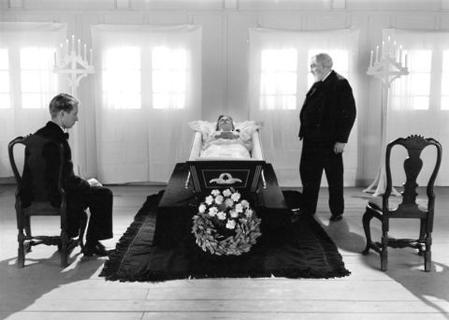James Schamus, Hollywood producer ("Lust, Caution", "Brokeback Mountain"), and author of "Carl Theodor Dreyer's Gertrud – The Moving Word" talks in this video about Dreyer creating great works of art without ever being head of a movement or a new wave. "He just did it":
Paul Auster, in his novel "Invisible", sends his character to the cinema to watch Dreyer's "The Word". He experiences the miracle at the end of the film as a transcendent moment that leaves him awestruck yet purified:
"After dinner, you and your sister ride the 104 bus down Broadway to the New Yorker theatre and walk into the coolness of that dark space to watch Carl Dreyer's 1955 film, 'Ordet' (The Word). Normally, you would not be interested in a film about Christianity and matters of religious faith, but Dreyer's direction is so exact and piercing that you are quickly swept up into the story, which begins to remind you of a piece of music, as if the film were a visual translation of a two-part invention by Bach." (pages 133-135, see full excerpt).

Carlos Reygadas, director of "Silent Light" that takes place in a Mennonite community in Mexico and is played by non-professional actors speaking the medieval German Plautdietsch dialect. The film tells the story of a farmer struggling with morality as he decides whether to leave his wife Esther for another woman:
"When I was preparing 'Silent Light' I noticed that Mennonite funerals were staged very similarly to the one in 'The Word'. After all, both take place among protestant peasants from Northern Europe. I realised that Esther's coming back to life would necessarily resemble Inger's (from 'The Word', ed.). There's not many ways in which such a thing may happen. The two women awake for different reasons. I just hoped that Esther's return could be as truthful as Inger's."
"When I saw 'The Word' I felt such pleasure I wanted to see the film every few months for the rest of my life. I have done so, together with 'Day of Wrath' and 'Gertrud' for years." (...)

Guillermo del Toro, director ("Hellboy", "Pan's Labyrinth"), has claimed Dreyer's "Vampyr" to be one of his favorite films and recorded in 2008 an audio commentary on Eureka's DVD edition:
"In strict terms, it is perhaps one of the few vampire films that have actually gone to the root of the mythos and made the vampire a spirit, not a physical creature." (...)
"It is foolish to try to decode the symbols in 'Vampyr'. It is important to understand the rhythm and the repetition of them. And it is important to try and talk about them in the most general sense, but one should not foolishly try to assign specific value to them, because in doing that you would asphyxiate the poem, you would asphyxiate the film."
David Bordwell, American film critic and professor of Film Studies at University of Wisconsin-Madison:
"Dreyer was what we might call a 'quiet rebel'. Without making a lot of noise, he shows how a filmmaker can expand his creative powers from project to project.
"At his heart Dreyer was a great inventor of cinematic forms, and his modest but tenacious commitment to experiment calls on young filmmakers to be innovators – bold, but also calm ones."
Will Gregory and Adrian Utley, composers, on creating their score for Jeanne d'Arc, performed live in Bristol May 2010:
"We chose 'Jeanne d'Arc' because we wanted to score a silent film, and out of an exhaustive list this was by far the best. No creaky plot, no melodrama, no weak moments or dated gestures. And the print looks as fresh as the day it was shot."
"It's unbelievable the amount of care expended on all aspects of the production: casting, lighting design and script. Plus the text is taken verbatim from the trial records ... a really serious aesthetic position for the foundation of a film about Joan Of Arc." Read the whole interview Music for a Saint
